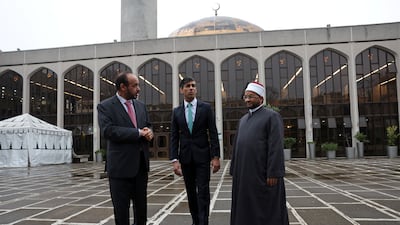The UK government has suffered a blow to its long-awaited appointment of an adviser against anti-Muslim hatred after one of the country’s leading campaigners stepped back from the role.
Anti-hate campaigner Fiyaz Mughal, who founded Faith Matters, ruled himself out as a frontrunner for the role after facing a barrage of abuse.
It is an embarrassing setback for the government in the week the Levelling Up and Communities Secretary Michael Gove prepares to unveil a long-awaited overhaul of the UK’s extremism policies.
Prime Minister Rishi Sunak visited a mosque in London today to "spread the message that anti-Muslim hatred has no place in UK society". He was announcing £117 million in new security measures to protect Muslim schools, centres and mosques around the country.
Last week, he called for the UK to draw a line against the "poison of extremism" as he warned the country was being torn apart by rising domestic tension.
Alan Mendosa, the director of the Henry Jackson Society think tank, told The National anyone who wanted the role of anti-Muslim hate adviser would need a “hide of steel”, and that the government will face a mammoth task to fill it.
The government has come under mounting pressure to appoint a new anti-Muslim hatred czar due to the role being vacant for more than two years despite recent figures showing anti-Muslim hate in the UK has more than tripled since Hamas’s attack on Israel.
Just last week Felicity Buchan, Under Secretary of State in the Department for Levelling Up, Housing and Communities, announced in the House of Commons that an appointment was imminent.
Mr Mughal said that since his name as a potential frontrunner was leaked last week, he had received "extreme threats", and said he has faced a "malicious, targeted campaign" against him from Islamist groups.
"This is the state of our country, sadly, that people who try to do what is right for our country – to bring communities together, to tackle extremism – are being hounded out of government,” he told Sky News.
"Enough is enough. I stepped away because it is traumatising to me ... I'm a working man.”

Mr Mughal – who also founded Tell MAMA (Measuring Anti-Muslim Attacks), a national project which records and measures anti-Muslim incidents in the UK – said the adviser post involved two days' work a month for £1,000 with no security protection, and accused the government of not taking the situation “seriously”.
Mr Mendosa told The National whoever took on the role will be “attacked” from all sides.
“It was never going to be an easy task to find an anti-Muslim hate crime czar given that the person will inevitably be attacked by those on the Islamist fringe who are worried that their extremism will be exposed by a moderate in the role, and by those on the Far Right who revel in their racism,” he said.
“Similar roles, like the UK’s anti-Semitism position, are unremunerated despite the massive rise in anti-Semitism since October 7.
“Any person who undertakes it will therefore need to have a hide of steel and be motivated by the mission, as well as being in a position to support themselves.
“While difficult, this is somewhat essential as the role is inherently an independent one where the person will need to sometimes criticise government as well as face down external critics.”

Imam Qari Asim was the last person to hold the post but he was removed in 2022 after calling for a film to be banned.
On Thursday, Mr Gove is due to announce his strategy for taking a tougher stance on groups and individuals “undermining” British values when he changes the UK’s definition of extremism, which has not been altered for over a decade.
Under Mr Gove’s plans to redefine extremism, the government is drawing up a list of organisations which will be banned from receiving public funds and engaging with government, and banned from university campuses.


